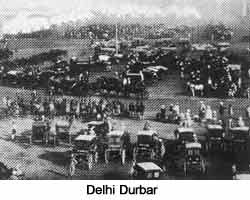

 |  |
 Tilak initially concentrated all his attention on seeking readmission, for himself and other extremists, into the Indian National Congress (I.N.C.). Many of the moderate leaders of the Congress were also unhappy with the happenings at Surat in 1907. They were quite sympathetic to Tilak's overtures. Further, they were under considerable pressure from Mrs. Annie Besant who had just joined the I.N.C. and was keen to arose Nationalist political activity, to admit the extremists.
But the annual Congress session in December 1914 was to prove a disappointment. Pherozeshah Mehta and his Bombay moderate group succeeded in keeping out the extremists. Tilak and Besant thereupon decided political activity on their own.
Tilak initially concentrated all his attention on seeking readmission, for himself and other extremists, into the Indian National Congress (I.N.C.). Many of the moderate leaders of the Congress were also unhappy with the happenings at Surat in 1907. They were quite sympathetic to Tilak's overtures. Further, they were under considerable pressure from Mrs. Annie Besant who had just joined the I.N.C. and was keen to arose Nationalist political activity, to admit the extremists.
But the annual Congress session in December 1914 was to prove a disappointment. Pherozeshah Mehta and his Bombay moderate group succeeded in keeping out the extremists. Tilak and Besant thereupon decided political activity on their own. In early 1915, Annie Besant launched a campaign through her two papers, New India and Commonweal, and organized public meetings and conferences to demand that India be granted self government on the lines of the white colonies after the war. From April 1915, her tone became more peremptory and her stance more aggressive. Meanwhile Tilak began his political activities. His efforts and those of Annie Besant were soon to meet with success, and at the annual session of the Congress in December 1915, it was decided that the extremist be allowed to rejoin the Congress. Tilak having gained the right of admission, now took the lead and set up the Home Rule League at the Bombay Provincial Conference held at Belgaum in April 1916. Annie Besant's impatient followers, unhappy with her decision to wait till September, secured her permission to start Home Rule groups. Jamnadas Dwarkadas, Shankarlal Banker and Indulal Yagni set up a Bombay paper 'Young India' and launced an all India propaganda fund to publish pamphlets in regional languages and English. In September 1916, Annie Besant announced the formation of her Home Rule League with George Arundale, her theosophical follower, as the organizing secretary. The two leaues acvoided any friction by demarcating their area of activity. Tilak's league was to work in Maharashtra (excluding Bombay), Karnataka, the Central Provinces and Berar and Annie Besant's league was given the charge of the rest of India. Tilak promoted the Home Rule campaign with a tour of Maharashtra and through his lectures clarified and popularized the concept of Home Rule. His stand on the question of non-Brahmin representation in the movement and the issue of untouchability demonstrated that he was no casteist. At the conference for the removal of untouchability during the Home Rule movement, Tilak declared: 'If a God were to tolerate untouchability, I would not recognize him as God at all'. next page >> |
Copyright ©2000 indiansaga.info. All rights reserved.
By using this service, you accept that you won't copy or use the data given in this website for any commercial purpose.
The material on indiansaga.info is for informational & educational purpose only.
This site is best viewed at 800 X 600 picture resolution.